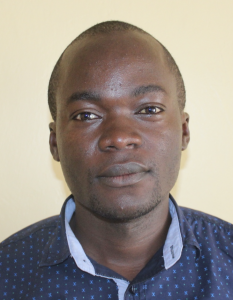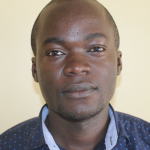Since Musukura Primary School was established in 2016, it has never had a source of water. For the 165 staff members and students to survive every school day, everyone must bring containers of water from home and leave the school grounds throughout the day to refill the school's water storage.
As you can imagine, this system causes several problems. The first is that students miss a lot of classes. They miss morning lessons when they're late due to collecting and carrying water. They miss daytime lessons and lunch when they leave school grounds to get more. But they miss entire days of school when they're sick due to drinking water from these unprotected, open sources and spending their days in unsanitary conditions.

"As a pupil of this school, I really get affected by the lack of clean and safe water," said student Mercy M (shown above collecting water from an unprotected local spring). "This has affected me in my studies, straining in carrying water from home to school, time wasted in collecting water, and also absenteeism due to health issues."
"As the sanitation teacher of this school, we have been affected by the lack of clean and safe water," said teacher Leonidas Kagehi (shown below, going with students to fetch water). "This has really contributed to the poor performance of our pupils since others miss lessons. The entire school's hygiene is not up to standard. The majority of our pupils fetch water from home and from different sources which are unsafe for us. We are at a constant risk of becoming sick."

Teachers and students have reported cases of typhoid, cholera, and chronic diarrhea. This isn't a surprise when students are fetching water with dirty containers from unprotected sources and the school can't be kept clean because there isn't enough water to do so. The latrines are not maintained properly, and they are so full of waste that they overflow when it rains, spilling sewage out into the school grounds. With no adequate water to wash their hands, students must make do without, constantly getting sick.
A borehole well right on school grounds will eliminate the need for students to miss class in search of water. A reliable water supply will enable the school to maintain its classrooms and latrines properly so that, hopefully, everyone's health will improve. With these tools in hand, the students and teachers should be able to look forward to brighter futures ahead.
Water at schools is unique, which is why we need unique solutions.
The Proposed Solution, Determined Together...
At The Water Project, everyone has a part in conversations and solutions. We operate in transparency, believing it benefits everyone. We expect reliability from one another as well as our water solutions. Everyone involved makes this possible through hard work and dedication.
In a joint discovery process, community members determine their most advantageous water solution alongside our technical experts. Read more specifics about this solution on the What We're Building tab of this project page. Then, community members lend their support by collecting needed construction materials (sometimes for months ahead of time!), providing labor alongside our artisans, sheltering and feeding the builders, and supplying additional resources.
Water Access for Everyone
This water project is one piece in a large puzzle. In Kenya, Sierra Leone, and Uganda, we're working toward complete coverage of reliable, maintained water sources that guarantee public access now and in the future within a 30-minute round trip for each community, household, school, and health center. One day, we hope to report that this has been achieved!
Training on Health, Hygiene & More
With the community's input, we've identified topics where training will increase positive health outcomes at personal, household, and community levels. We'll coordinate with them to find the best training date. Some examples of what we train communities on are:
- Improved hygiene, health, and sanitation habits
- Safe water handling, storage & treatment
- Disease prevention and proper handwashing
- Income-generation
- Community leadership, governance, & election of a water committee
- Operation and maintenance of the water point
Handwashing Stations
Alongside each water source, we also provide two new gravity-fed handwashing stations that will allow everyone at the school to wash their hands without running water. Handwashing is so important to help prevent future water-related illnesses in the school community.
The student health club will maintain the stations, fill them with water, and supply them with soap (which we will teach the school community how to make during the training!).
VIP Latrines
In addition, we will construct two triple-door Ventilated Improved Pit (VIP) latrine blocks designed to prevent fecal disease transmission. Each latrine will have a cement floor, which is easy to use and clean regularly. Three doors will serve the girls, and three doors will serve the boys.






 Borehole Well and Hand Pump
Borehole Well and Hand Pump
 Rehabilitation Project
Rehabilitation Project

































